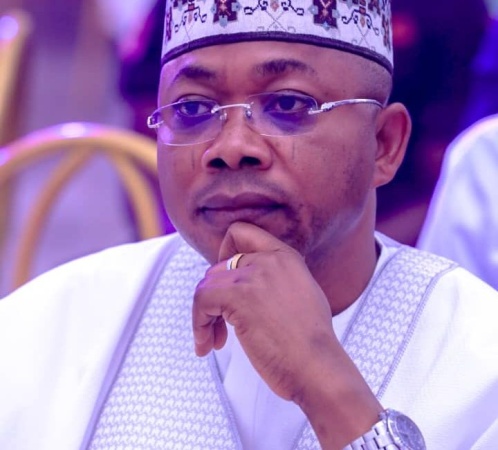

























Loading banners


NEWS EXPRESS is Nigeria’s leading online newspaper. Published by Africa’s international award-winning journalist, Mr. Isaac Umunna, NEWS EXPRESS is Nigeria’s first truly professional online daily newspaper. It is published from Lagos, Nigeria’s economic and media hub, and has a provision for occasional special print editions. Thanks to our vast network of sources and dedicated team of professional journalists and contributors spread across Nigeria and overseas, NEWS EXPRESS has become synonymous with newsbreaks and exclusive stories from around the world.

EERC logo
The Enugu Electricity Regulatory Commission (EERC) has stated that the Nigerian Electricity Regulatory Commission (NERC) lacks jurisdiction over tariff decisions made by sub-national regulatory bodies.
Joe Aneke, Special Adviser to the Governor of Enugu State on Power, made this assertion during a meeting with state commissioners for energy on the electricity market, held in Abuja on Tuesday.
The meeting was convened following EERC?s recent reduction of the Band A electricity tariff from ?209/kWh to ?160/kWh. Aneke emphasised that NERC?s regulatory powers do not extend to tariff-setting by state-level electricity commissions.
He explained that the Enugu Power Commission had developed its tariffs independently, relying on its own data and software rather than NERC?s models.
He also highlighted persistent challenges in accessing essential data from NERC and EEDC, which is legally required to provide such information.
Aneke criticised NERC?s approach, pointing out that it did not reach out to the Enugu regulator for clarification before issuing public criticisms.
According to him, Enugu Power Commission?s enabling law has been available on its website for over a year and any concern could have been raised much earlier.
He clarified that the commission?s tariff decisions are limited strictly to distribution activities, as generation and transmission remain under NERC?s regulatory oversight.
Aneke explained that Enugu?s tariff methodology is cost-reflective, developed after careful analysis of data provided by EEDC, and aimed at preventing debt accumulation while balancing the interests of consumers and service providers.
He noted that the legal framework empowering sub-national regulators took over a decade to develop, with technical support from the World Bank and UK aid agencies.
Although NERC had requested some data and explanations, Aneke maintained that the national body lacks the mandate to override decisions made by state regulators.
Read also: Enugu on track to energy sufficiency as EERC issues fresh 5MW licence
He called for improved collaboration and data-sharing between NERC, state commissions and distribution companies to enhance transparency and accuracy in tariff development.
Addressing misconceptions, Aneke dismissed claims that Enugu?s tariff adjustment was politically motivated or an attempt to undermine federal authority.
He insisted that the state commission operates independently and within its legal remit. He also cited misclassification of some Band A customers as a factor contributing to confusion and disputes around the tariff structure.
He reiterated that despite multiple requests, timely access to full datasets from NERC and EEDC had been problematic, further complicating the tariff-setting process.
He emphasised that Enugu Commission regulates only distribution tariffs and ensures that EEDC meets its financial obligations, such as payments to the Nigerian Bulk Electricity Trading Plc. (NBET).
Generation and transmission, he affirmed, remain the responsibility of NERC.
Aneke urged all stakeholders to adopt a fact-based and collaborative approach to strengthen the power sector, cautioning against the spread of misinformation and regulatory overreach.
Meanwhile, Adebayo Adelabu, the Minister of Power has called for improved coordination between federal and state power institutions to avoid disruptions in the electricity market.
Adelabu acknowledged the constitutional rights of states to shape their own electricity markets, but stressed the need for federal involvement, particularly given its custodianship of the grid and wholesale market.
He emphasised that Nigeria?s electricity sector is an interconnected ecosystem, requiring coordinated efforts across state lines for generation, transmission and distribution.
The minister warned that regulatory misalignment at the sub-national level could cause technical, commercial or legal conflicts, weaken grid stability, affect neighbouring states? power supply and deter investment.
He said working together would protect the integrity of the national grid, optimise shared resources, ensure reliable and affordable electricity for all Nigerians.
He also urged states to prioritise the electrification of unserved and underserved communities, noting that the Rural Electrification Agency (REA) is available to provide technical and financial support.
The minister highlighted the importance of innovative off-grid solutions, such as mini-grids and standalone systems, in expanding access to electricity in remote and energy-poor regions.
Reaffirming his message, Adelabu stressed the importance of regulatory alignment across the value chain.
He said the shared goal is to provide all Nigerians?regardless of location with dependable electricity to support homes, businesses and economic growth. ?For that to happen, federal and state regulators must harmonise standards, coordinate frameworks and offer clear and stable policies that encourage investor confidence.?
He warned that a fragmented regulatory environment would create uncertainty and hinder progress.
Also speaking at the meeting, Eka Williams, Chairman of the Forum of Commissioners for Power and Energy in Nigeria, said there is no ongoing conflict between state and federal governments regarding electricity market regulation.
He emphasized that states remain committed to delivering value for consumers and fully support the effective implementation of the Electricity Act.
Williams called for clarity on states position concerning the proposed amendments to the Act and reiterated their dedication to build a unified and sustainable electricity market. (BusinessDay)